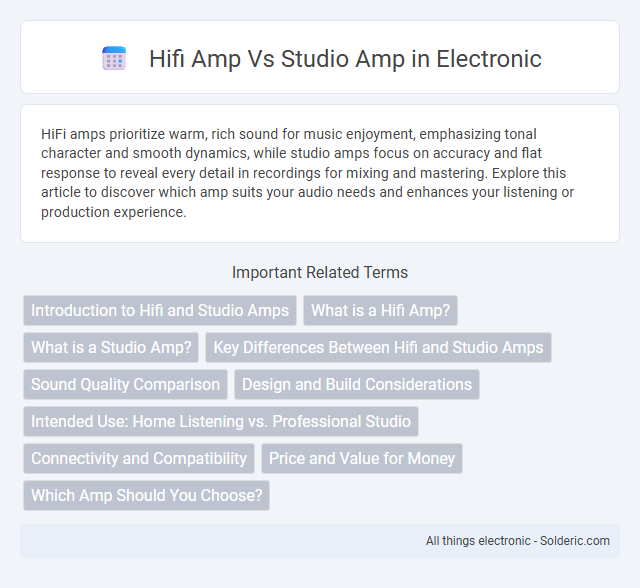HiFi amps prioritize warm, rich sound for music enjoyment, emphasizing tonal character and smooth dynamics, while studio amps focus on accuracy and flat response to reveal every detail in recordings for mixing and mastering. Explore this article to discover which amp suits your audio needs and enhances your listening or production experience.
Comparison Table
| Feature | HiFi Amplifier | Studio Amplifier |
|---|---|---|
| Purpose | Consumer audio for music enjoyment | Professional audio for mixing and recording |
| Sound Accuracy | Warm, enhanced bass and treble | Flat, neutral frequency response |
| Power Output | Moderate, optimized for home listening | High power for accurate monitoring |
| Build Quality | Focus on aesthetics and compactness | Durable, designed for studio use |
| Connectivity | Standard consumer inputs (RCA, AUX) | Professional inputs (XLR, TRS) |
| Impedance Range | Supports 4-16 ohms speakers | Supports low-impedance studio monitors |
| Price Range | Affordable to mid-range | Mid to high-end pricing |
Introduction to Hifi and Studio Amps
Hifi amps prioritize delivering high-fidelity sound with warmth and tonal accuracy ideal for music enthusiasts seeking precise audio reproduction in home environments. Studio amps, engineered for professional settings, emphasize flat frequency response and neutrality to ensure accurate monitoring and mixing without coloration. Your choice depends on whether you need enhanced listening pleasure or technical audio precision.
What is a Hifi Amp?
A HiFi amplifier is designed to reproduce audio with high fidelity, emphasizing clarity, warmth, and a natural sound suitable for home listening environments. It typically supports a wide frequency range, low distortion, and is optimized for smooth soundstage and tonal accuracy rather than maximum power output. Unlike studio amplifiers, HiFi amps prioritize sonic richness and listening pleasure over the precise, flat response required for audio production and mixing tasks.
What is a Studio Amp?
A studio amp is designed for professional audio production, offering precise sound reproduction and flat frequency response to ensure accurate monitoring during mixing and mastering. Unlike hi-fi amps that prioritize enhancing audio for pleasurable listening, studio amps maintain neutrality to reveal every detail in recordings. These amplifiers often include features like low distortion, balanced inputs, and robust build quality to support critical audio work in recording studios.
Key Differences Between Hifi and Studio Amps
HiFi amps prioritize sound quality with warm, musical tones ideal for casual listening, while studio amps emphasize accuracy and flat frequency response to ensure precise audio monitoring. Your choice depends on whether you value sonic coloration and immersive experience (HiFi) or uncolored, transparent sound critical for mixing and mastering (studio amps). Key differences include HiFi amps often incorporating features like tone controls and elaborate amplification stages, whereas studio amps focus on reliability, durability, and minimal signal distortion.
Sound Quality Comparison
HiFi amps prioritize warm, immersive sound with enhanced bass and smooth highs, designed for casual listening and musical enjoyment. Studio amps focus on delivering accurate, flat frequency response with minimal distortion to ensure precise mixing and mastering. The difference lies in HiFi amps enhancing sound flavor, while studio amps maintain neutrality for critical audio work.
Design and Build Considerations
HiFi amps prioritize elegant design with premium materials and compact form factors for seamless integration into home audio setups, while studio amps focus on rugged construction and functional layouts to withstand demanding professional environments. HiFi amplifiers emphasize aesthetic appeal and user-friendly controls tailored for personalized listening experiences, whereas studio amps offer robust build quality and reliability essential for extended sessions and heavy usage. Choosing between the two depends on Your need for stylish, high-fidelity sound reproduction or durable, precision-driven amplification in a studio setting.
Intended Use: Home Listening vs. Professional Studio
HiFi amps are designed primarily for home listening, delivering warm, rich sound that enhances music enjoyment in personal environments with an emphasis on tonal quality and user-friendly controls. Studio amps prioritize accuracy and transparency, providing flat frequency response to ensure sound engineers hear every detail without coloration, essential for mixing and mastering in professional studios. Your choice should align with whether you value immersive listening comfort at home or precise sound reproduction for critical audio work.
Connectivity and Compatibility
HiFi amps typically offer versatile connectivity options including Bluetooth, RCA, optical, and sometimes USB inputs, catering to a wide range of consumer audio devices and streaming sources. Studio amps prioritize compatibility with professional audio equipment, featuring balanced XLR and TRS inputs for noise reduction and accurate signal transmission in recording environments. The choice between HiFi and studio amps depends on the desired integration with either consumer electronics or professional audio interfaces, ensuring optimal signal quality and device interoperability.
Price and Value for Money
HiFi amps generally offer more affordable options with a focus on warm, pleasing sound ideal for casual listening, providing great value for money for everyday users. Studio amps tend to be pricier due to their precision, durability, and flat frequency response necessary for accurate audio monitoring in professional environments. Your choice depends on whether budget or audio accuracy holds more value in your specific listening or production needs.
Which Amp Should You Choose?
Choosing between a HiFi amp and a studio amp depends on your primary audio needs and environment. HiFi amplifiers prioritize warmth, smoothness, and musicality for casual listening with consumer-grade speakers, while studio amps emphasize accuracy, neutrality, and detailed sound reproduction for professional monitoring. If you seek precise sound for mixing or mastering, a studio amp is ideal; for enjoyable, immersive music playback, a HiFi amp is the better choice.
Hifi amp vs Studio amp Infographic

 solderic.com
solderic.com